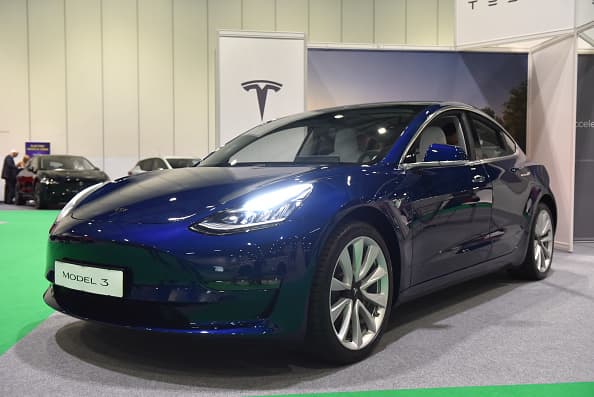Tesla’s Model 3 was the UK’s second most popular new car in 2021

A Tesla Model 3 photographed in London, England, on May 16, 2019.
John Keeble | Getty Images News | Getty Images
LONDON — A record 190,727 new battery electric cars were registered in the U.K. last year, according to figures released on Thursday, with Tesla’s Model 3 the best-selling battery electric model.
The vehicle was the second most popular new car overall, according to Society of Motor Manufacturers and Traders, behind the Vauxhall Corsa.
The Model 3 is an all-electric sedan. In the U.K., Tesla lists its cash price as starting at £44,490 (around $60,202). The price of a five-door, gasoline version of the Corsa starts at £17,380, according to Vauxhall.
In a release Thursday, the SMMT described 2021 as the “most successful year in history for electric vehicle uptake.” It said that more new battery electric vehicles had been registered in 2021 than over the five previous years combined.
The last 12 months also saw 114,554 new plug-in hybrid cars take to Britain’s roads, while 147,246 hybrid electric cars were also registered. Plug-in hybrid vehicles can be filled with gas in the normal way and also plugged in to charge. Hybrid electric cars do not have the option of plug-in charging.
While the figures for electric vehicles look promising, the overall market is challenging.
The SMMT said new car registrations amounted to a little under 1.65 million in 2021, which represents a year-on-year increase of only 1%. “The figures underline the ongoing impact of Covid and the semiconductor shortage on the industry,” it said.
Commenting on the figures, the SMMT’s chief executive, Mike Hawes, said it had been “another desperately disappointing year for the car industry,” adding that Covid continued to “cast a pall over any recovery.”
“Manufacturers continue to battle myriad challenges, with tougher trading arrangements, accelerating technology shifts and, above all, the global semiconductor shortage which is decimating supply,” he said.
The increase in electric car uptake was “the undeniable bright spot,” Hawes said, before going on to emphasize the importance of both infrastructure and cost.
“Recent cuts to incentives and home charging grants should be reversed,” he said, “and we need to boost the roll out of public on-street charging with mandated targets, providing every driver, wherever they live, with the assurance they can charge where they want and when they want.”
The U.K. wants to stop the sale of new diesel and gasoline cars and vans by 2030. It will require, from 2035, all new cars and vans to have zero tailpipe emissions.
The task is huge and the sector is still dominated by vehicles running on fossil fuels. Gasoline cars’ market share of new registrations stood at 46.3% in 2021, while diesel cars’ came in at 8.2%.
Ramping up charging infrastructure in the years ahead will be crucial when it comes to dispelling concerns about range anxiety — or the fear that EVs are unable to undertake long journeys without losing power and getting stranded.
While infrastructure is crucial, the range of electric vehicles is also starting to increase. Tesla says its Model S Plaid has an estimated range of 396 miles, while Lucid has said its Air Dream Edition R has 520 miles of range.
On Monday, Daimler released details of a concept electric vehicle which it said had a range of over 1,000 kilometers (around 621 miles) on one charge. The German automotive giant said the range figures were “preliminary and based on digital simulations in real-life traffic conditions.”




